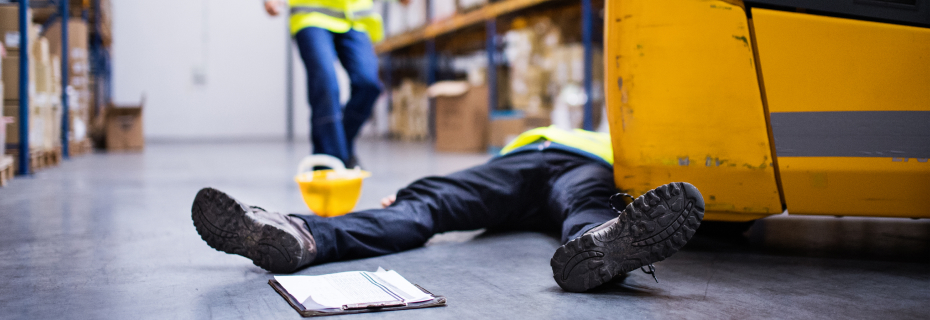Who Can Be Held Liable for an Industrial Accident?
Depending on the circumstances, any of the following parties could be partially or fully liable for an industrial accident work injury:
An Employer
Employers that provide workers’ compensation coverage are largely exempt from liability for worker injuries in Texas. However, a Texas employer could be liable if they lack workers’ comp coverage or if their negligence directly contributes to an employee’s death.
A Manufacturer
If a piece of machinery or equipment was defectively designed, manufactured, or marketed, the manufacturer could be held responsible for resulting injuries.
A Property Owner
If the accident occurred on property the employer doesn’t own, the property owner could be liable for injuries stemming from unsafe conditions on the premises.
A Contractor or Subcontractor
In industrial settings, multiple contractors and subcontractors often work together. If a contractor causes an accident, they could be liable if others get hurt.
What’s the Difference Between a Workers’ Compensation Claim and a Third-Party Claim?
Workers file workers’ compensation claims with their employers’ insurance companies. These claims provide benefits like medical care coverage and wage replacement, regardless of who was at fault for the accident. However, workers’ comp typically won’t cover subjective losses like pain and suffering or the full value of lost wages.
Conversely, a third-party claim is a claim against a party other than the employer (like a contractor or equipment manufacturer) who is partially or fully liable for the accident. Workers can recover a broader compensation range with this type of claim, including money for pain, suffering, and all their lost earnings. However, they must prove that the liable parties were at fault to do so.
Can I File a Third-Party Claim for a Construction Accident While Receiving Workers’ Compensation?
Yes. Even if you’re already receiving workers’ compensation benefits, you could still have the right to file a third-party claim against any non-employer entities that contributed to your work accident. This may include manufacturers of faulty equipment, subcontractors, or property owners.
But keep in mind that if you win a third-party claim, your employer’s insurance company might be entitled to recover part of the money it paid you in workers’ compensation benefits. Handling multiple injury claims is a complex process that requires the assistance of an experienced Houston personal injury lawyer.
What Compensation Can a Worker Receive After Being Involved in an Industrial Accident?
If you were involved in an industrial accident in Texas, you could be entitled to various forms of compensation from one or more sources to alleviate your injury-related losses.
Workers’ Compensation Benefits
First, let’s discuss the types of benefits available through workers’ compensation claims in Texas. These benefits could include the following:
- Medical Benefits – These benefits cover all necessary medical treatment related to your work injury or illness, from emergency care to ongoing treatment and rehabilitation.
- Income Benefits – Income benefits replace a portion of the income you lose if you temporarily miss work, can only accept lower-paying work, or cannot work at all due to your condition.
- Burial Benefits – If a worker dies as a result of an occupational injury or illness, these benefits can cover some of their funeral expenses.
- Death Benefits – Death benefits provide financial support to surviving dependents of workers who die as a result of occupational injuries or illnesses.
There are also four subtypes of benefits within the broader category of workers’ comp income benefits:
- Temporary Income Benefits (TIBs) – These benefits, which replace a portion of lost income, are for workers temporarily out of work or only able to perform light-duty work for lower pay.
- Impairment Income Benefits (IIBs) – If a worker sustains a permanent impairment from a work injury, they could claim IIBs based on the impairment rating a doctor assigns them.
- Supplemental Income Benefits (SIBs) – These income replacement benefits are for workers with impairment ratings of 15 percent or higher who still cannot work after their IIBs run out.
- Lifetime Income Benefits (LIBs) – In cases of severe, life-altering injuries, such as loss of limb or total blindness, LIBs could provide compensation for the remainder of the injured worker’s life.
Compensation from a Third-Party Work Injury Claim
If you got hurt due to the wrongful behavior of a third party (someone other than your employer or a co-worker), you could also be entitled to money from a third-party work injury claim. With a valid third-party claim, you could seek compensation for the following:
- Medical care expenses
- Anticipated future medical costs
- The full value of your lost income
- Lost future earning capacity
- Pain and suffering
- Emotional distress
- Loss of consortium
What Evidence Is Needed for a Worker Making an Industrial Accident Claim?
It depends. If you’re filing a workers’ compensation claim, you’re not required to prove that your employer or any other party was at fault for your injury. You can even claim benefits if you are at fault yourself. However, you’ll still need to prove that you and your injury qualify for benefits, which could require evidence such as the following:
- Medical records
- Employment records
- Incident reports
- Witness statements
In a third-party work injury claim, you must prove that a party other than your employer or a co-worker was at fault for your accident. This requires substantial evidence, possibly including the following:
- Photos or videos of your injury and the area where it happened
- Testimony from experts like accident reconstructionists
- Proof of negligence, such as safety violations or inadequate maintenance
- Proof of intentional misconduct, such as internal documents or ruined evidence
How a Houston Industrial Accident Attorney Can Help with Your Case
In the aftermath of an industrial accident, having an experienced Houston attorney at your side can be a game-changer. From your initial consultation onward, your lawyer can support you in numerous ways, including the following:
- Investigating the circumstances that led to the industrial accident and your injuries
- Identifying liable parties and possible sources of compensation for your case
- Gathering and preserving helpful evidence to strengthen your claim
- Consulting medical professionals and industry experts for useful testimony
- Filing all necessary claim paperwork and adhering to critical deadlines on your behalf
- Negotiating with insurers to demand the benefits or compensation you are owed
- Taking your case to court and advocating for you at trial, if necessary







